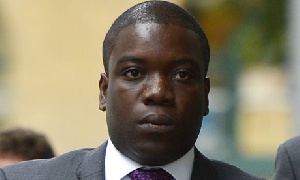Kweku Adoboli repeatedly broken down in tears on Friday as the former UBS "rogue trader" defended himself against charges that he gambled away £1.5bn of his Swiss bank's money.
Adoboli, 32, burst into tears several times as he told the court in his first day of testimony that he was so wedded to his job that he put in 16-hour days, sometimes slept under his desk, and skipped his grandmother's funeral because he couldn't bear to drag himself away from his trading platform as he battled to reverse multimillion-pound losses.
"UBS was my family and every single thing I did, every single bit of effort I put into that organisation, was for the benefit of the bank. That is everything I lived for," he said as he dabbed his eyes with a paper handkerchief in the witness box of court three at Southwark crown court. "To find yourself in Wandsworth prison for nine months because all you did was worked so hard for this bank."
At one point, he became so distraught that Judge Brian Keith interrupted proceedings to tell Adoboli that he shouldn't be embarrassed about becoming overrun by his emotions, and that it gave the jury a chance to "see the man behind the name".
Adoboli spent his childhood in Israel and Syria, where his father, a United Nations diplomat, was posted, before being sent to a Quaker boarding school in Yorkshire.
He described his rapid ascent up the ranks after joining UBS as a graduate trainee straight from Nottingham University. The only other job he had before joining the bank was as a waiter.
The court heard that when the financial crisis began to take hold in 2007 it was just Adoboli, then aged 27, and John Hughes, 24, in charge of a $50bn (£31bn) portfolio of assets on the bank's exchange traded funds desk in London.
"Our book was massive. A tiny mistake led to huge losses. We were these two kids trying to make it work," he said. "There was a total of 30 months in trading [experience] between the two of us and we were in charge of a $50bn book. We were just losing so much money – it was mental."
Prosecutors claim Adoboli began fraudulently trading in 2008 in order to hide the huge losses that were stacking up. The unauthorised trades remained hidden for years in so-called umbrella accounts set up to store the funds.
The unauthorised, or "dummy", trades eventually cost the bank £1.4bn – the biggest-ever rogue trading losses in British history – and wiped £3bn off its share price. Adoboli, who denies two charges of fraud and two of false accounting, said the trades were "not fraudulent – it [was] finding a way to do your job".
He said lots of traders were afraid that UBS may have been about to follow other big banks by collapsing, and said everyone at the bank was asking themselves: "What can we do to help this organisation survive this incredible crisis?
"Every moment of every day [I] spent thinking, 'How do I make this book work?' Nothing else was important enough to overcome that."
He told the court that in order to try to claw back the losses, he was getting up at 4am to catch up on developments in the markets overnight, before cycling to work at 6am and often staying there until well past midnight.
"The hours were immense," he said. "You were at your desk all the time.
"My grandmother died and I was unable to go to her funeral. It was just John [Hughes] on the desk, it was impossible to leave.
"My life became work," he added as he broke down in tears for the fourth time.
Adoboli, in a dark suit and maroon tie, said he carried out the unauthorised trades for "the book, and the bank", and not out of personal greed, as alleged by the prosecution.
Hughes, who gave evidence earlier in the trial, had described Adoboli as "gung-ho" and "quite a maverick". "He did not really care about the book as a whole. He cared about being a profitable trader," Hughes had said.
The court had previously heard that Adoboli walked out of the bank saying he was going to a doctor's appointment and an hour later sent a "bombshell" email detailing the losses from his personal account.
"I am deeply sorry to have left this mess for everyone and have put my bank and my colleagues at risk," he wrote in the email.
The trial continues.
General News of Friday, 26 October 2012
Source: The Guardian













